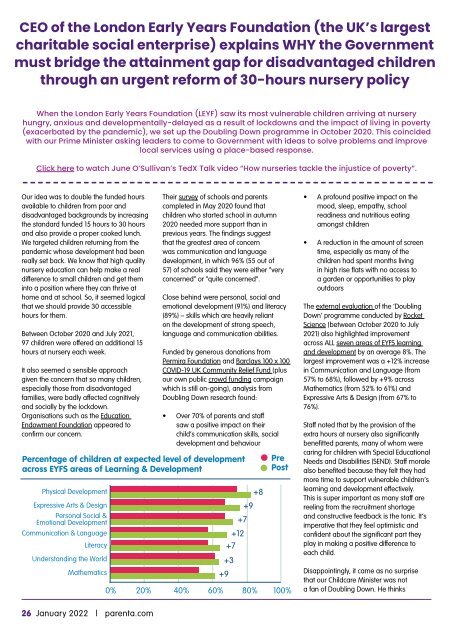January 2022 Parenta magazine
You also want an ePaper? Increase the reach of your titles
YUMPU automatically turns print PDFs into web optimized ePapers that Google loves.
CEO of the London Early Years Foundation (the UK’s largest<br />
charitable social enterprise) explains WHY the Government<br />
must bridge the attainment gap for disadvantaged children<br />
through an urgent reform of 30-hours nursery policy<br />
When the London Early Years Foundation (LEYF) saw its most vulnerable children arriving at nursery<br />
hungry, anxious and developmentally-delayed as a result of lockdowns and the impact of living in poverty<br />
(exacerbated by the pandemic), we set up the Doubling Down programme in October 2020. This coincided<br />
with our Prime Minister asking leaders to come to Government with ideas to solve problems and improve<br />
local services using a place-based response.<br />
Click here to watch June O’Sullivan’s TedX Talk video “How nurseries tackle the injustice of poverty”.<br />
Our idea was to double the funded hours<br />
available to children from poor and<br />
disadvantaged backgrounds by increasing<br />
the standard funded 15 hours to 30 hours<br />
and also provide a proper cooked lunch.<br />
We targeted children returning from the<br />
pandemic whose development had been<br />
really set back. We know that high quality<br />
nursery education can help make a real<br />
difference to small children and get them<br />
into a position where they can thrive at<br />
home and at school. So, it seemed logical<br />
that we should provide 30 accessible<br />
hours for them.<br />
Between October 2020 and July 2021,<br />
97 children were offered an additional 15<br />
hours at nursery each week.<br />
It also seemed a sensible approach<br />
given the concern that so many children,<br />
especially those from disadvantaged<br />
families, were badly affected cognitively<br />
and socially by the lockdown.<br />
Organisations such as the Education<br />
Endowment Foundation appeared to<br />
confirm our concern.<br />
Their survey of schools and parents<br />
completed in May 2020 found that<br />
children who started school in autumn<br />
2020 needed more support than in<br />
previous years. The findings suggest<br />
that the greatest area of concern<br />
was communication and language<br />
development, in which 96% (55 out of<br />
57) of schools said they were either “very<br />
concerned” or “quite concerned”.<br />
Close behind were personal, social and<br />
emotional development (91%) and literacy<br />
(89%) – skills which are heavily reliant<br />
on the development of strong speech,<br />
language and communication abilities.<br />
Funded by generous donations from<br />
Permira Foundation and Barclays 100 x 100<br />
COVID-19 UK Community Relief Fund (plus<br />
our own public crowd funding campaign<br />
which is still on-going), analysis from<br />
Doubling Down research found:<br />
• Over 70% of parents and staff<br />
saw a positive impact on their<br />
child’s communication skills, social<br />
development and behaviour<br />
Percentage of children at expected level of development<br />
across EYFS areas of Learning & Development<br />
Physical Development<br />
Expressive Arts & Design<br />
Personal Social &<br />
Emotional Development<br />
Communication & Language<br />
Literacy<br />
Understanding the World<br />
Mathematics<br />
0%<br />
+9<br />
+7<br />
+12<br />
+7<br />
+3<br />
+9<br />
+8<br />
Pre<br />
Post<br />
20% 40% 60% 80% 100%<br />
• A profound positive impact on the<br />
mood, sleep, empathy, school<br />
readiness and nutritious eating<br />
amongst children<br />
• A reduction in the amount of screen<br />
time, especially as many of the<br />
children had spent months living<br />
in high rise flats with no access to<br />
a garden or opportunities to play<br />
outdoors<br />
The external evaluation of the ‘Doubling<br />
Down’ programme conducted by Rocket<br />
Science (between October 2020 to July<br />
2021) also highlighted improvement<br />
across ALL seven areas of EYFS learning<br />
and development by an average 8%. The<br />
largest improvement was a +12% increase<br />
in Communication and Language (from<br />
57% to 68%), followed by +9% across<br />
Mathematics (from 52% to 61%) and<br />
Expressive Arts & Design (from 67% to<br />
76%).<br />
Staff noted that by the provision of the<br />
extra hours at nursery also significantly<br />
benefitted parents, many of whom were<br />
caring for children with Special Educational<br />
Needs and Disabilities (SEND). Staff morale<br />
also benefited because they felt they had<br />
more time to support vulnerable children’s<br />
learning and development effectively.<br />
This is super important as many staff are<br />
reeling from the recruitment shortage<br />
and constructive feedback is the tonic. It’s<br />
imperative that they feel optimistic and<br />
confident about the significant part they<br />
play in making a positive difference to<br />
each child.<br />
Disappointingly, it came as no surprise<br />
that our Childcare Minister was not<br />
a fan of Doubling Down. He thinks<br />
30-hours risks children not benefitting<br />
from the Government’s own policy of 30<br />
hours. Quoting the SEED Impact Report<br />
from February 2020, the Minister and<br />
his advisers seem overly focused on a<br />
very small negative effect on children’s<br />
emotional self-regulation among children<br />
using nursery for more than fifteen hours<br />
per week between the age of two and the<br />
start of school.<br />
The research noted a very small<br />
unfavourable association between formal<br />
Early Childhood Education and Care<br />
(ECEC) use and children’s socioemotional<br />
outcomes but contrasted with the largely<br />
positive associations, the impact was<br />
negligible and the researchers wondered<br />
whether the reasons for these<br />
unexpected differences lay in the source<br />
of the socio-emotional measures. The<br />
age four socio-emotional measures were<br />
derived from parent report, whereas the<br />
later outcomes were derived from teacher<br />
report. The question will be considered at<br />
age seven in a later SEED report.<br />
The Sutton Trust’s recent report. ‘A Fair<br />
Start – Equalising Access to Early Education’<br />
and the Institute for Fiscal Studies (IFS) both<br />
argue for extending the 15-hours funded<br />
places to children from disadvantaged<br />
backgrounds. The estimated cost of<br />
universalising the 30-hour entitlement<br />
would raise spending by around £250<br />
million in 2024–25. Extending the<br />
entitlement to disadvantaged three-and<br />
four-year-olds would cost an extra £165<br />
million a year. This is compared to the<br />
roughly £735 million that the existing 30-<br />
hour entitlement will cost. But the benefits<br />
and the return on the investment would be<br />
significant.<br />
Our research provides a strong message<br />
to both the Government and to global<br />
investors, and demonstrates that we need<br />
to think carefully about how we respond<br />
to the fast-emerging problems we are<br />
seeing across the country as a result of<br />
the pandemic. We clearly need to reverse<br />
the alarming decline in the health, wellbeing<br />
and education amongst our young<br />
children. Access to these crucial extra<br />
Government funded hours is benefitting<br />
children now and can actually help them<br />
level up and reduce the attainment gap<br />
that emerges from 22 months in children<br />
from disadvantaged backgrounds. Doing<br />
nothing is simply not an option.<br />
So, back to Boris and his call for leaders<br />
to provide examples of good practice<br />
which we can learn from and drive<br />
levelling-up and systemic change. Failure<br />
to close the attainment gap continues to<br />
have devastating consequences for the<br />
1.3 million children aged 0-5 who live in<br />
poverty. Just look at the most recent report<br />
about disadvantaged white pupils.<br />
Our Secretary of State for Education,<br />
Nadhim Zahawi must put his money where<br />
his mouth is. He is right when he says<br />
June O’Sullivan<br />
June O’Sullivan MBE is Chief Executive of<br />
the London Early Years Foundation (LEYF),<br />
one of the UK’s largest charitable childcare<br />
social enterprises which currently runs 39<br />
nurseries across twelve London boroughs.<br />
An inspiring speaker, author and regular<br />
media commentator on early years, social<br />
business and child poverty, June has<br />
been instrumental in achieving a major<br />
strategic, pedagogical and cultural shift<br />
for the award-winning London Early Years<br />
Foundation, resulting in an increased<br />
profile, a new childcare model and a<br />
stronger social impact over the past ten<br />
years.<br />
@juneosullivan<br />
Facebook | Twitter | Instagram | LinkedIn<br />
“… you don’t tackle inequality and poverty<br />
unless you tackle education.”<br />
https://leyf.org.uk/doubling-down/<br />
26 <strong>January</strong> <strong>2022</strong> | parenta.com<br />
parenta.com | <strong>January</strong> <strong>2022</strong> 27

















